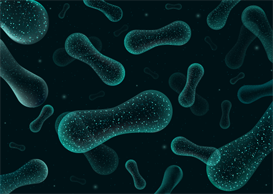– Your Inner Ecosystem
After watching the movie ‘Microbirth’ (2016) I became extremely interested in the microbiome and its effects on long term health. This has prompted me to look deeper. I’m amazed at how the smallest, oldest living organisms are still essential parts of our daily existence.
The Human Microbiome – YOUR unique Microbial Footprint
What exactly is a Microbiome?
 These earliest life-forms- bacteria, viruses, archaea, fungi- live on and in our bodies and call us home. We depend on these trillions of microbes, which outnumber our genetic cells, for proper functioning. The unique interplay of genes and microbes determines most of our health, diseases, mood, fertility and longevity. While we as human beings have closely related genetic codes, our individual gut microbiomes are vastly different. It is this interplay between genes and microbes which builds diversity in gene expression. Much like a fingerprint, each person’s microbiome is unique.
These earliest life-forms- bacteria, viruses, archaea, fungi- live on and in our bodies and call us home. We depend on these trillions of microbes, which outnumber our genetic cells, for proper functioning. The unique interplay of genes and microbes determines most of our health, diseases, mood, fertility and longevity. While we as human beings have closely related genetic codes, our individual gut microbiomes are vastly different. It is this interplay between genes and microbes which builds diversity in gene expression. Much like a fingerprint, each person’s microbiome is unique.
Recent research shows that although some microbial exposure happens in utero, the main seeding (contact with microbes) happens during birth. In a vaginal delivery, the mother’s microbiota is handed down to the child through the exposure to vaginal, fecal, and skin microbes – which is considered highly beneficial. Feeding with breast milk not only nourishes the baby, but it is essential in growing their microbiome and immune system.
While the gut goes through its main maturing process in the first two years of life, it is still highly influenced by diet and environmental factors. Recent research developments confirmed there are also significant microbial shifts due to hormones and metabolic changes- like during pregnancy and with age.
So right from the get go we see the strong connection between internal and external environmental factors in the development of our internal ecosystem. That being said, our microbiome shifts even after each meal, so it matters what we are eating!
Although the research on the human microbiome is young (the term was coined in 2001), the increased interest has been fueled by the uptick of ailments like leaky gut syndrome, autoimmune diseases, allergies, asthma, autism, and infertility: all pointing to a strong connection to problems in our gut.
While this research is new, we have a long-standing tradition as humans to take care of our gut health. For centuries, in all different cultures, we have been eating fermented foods- like pickles, sauerkraut, kimchi, and olives as our source of pre and probiotics.
Hippocrates saying: ‘All disease starts in the gut’ has taken on a new depth.
Scientists have begun mapping out the diversity of our microflora in search of the core essential microbes. Although there is no conclusion, it seems that simply increasing the diversity of microbes is the most beneficial.
So how can we support the health of our microbiome?
EAT REAL FOOD – with lots of vegetables and low sugar fruits nourish the diversity of your microbiome. Leafy greens, radishes, onions, garlic, turmeric all support the growth of healthy bacteria. They are anti-inflammatory, meaning your bacteria doesn’t have to snack on your intestinal lining to be nourished.
ADD FERMENTED FOODS TO YOUR DIET – fermented foods like pickles, sauerkraut, and kimchi build a friendly environment for your microbiome.
AVOID PROCESSED FOODS AND SUGARS – they are absorbed quickly into your small intestines and starve your microbiome, while growing challenging bacteria like candida.
RELAX – Eat your food in a relaxed state of mind, chew well and slow down.
EXERCISE MORE – Exercise increases circulation, making all the nutrients more accessible throughout your body.
BE IN NATURE – Cultivating house plants, working in the garden, or even petting your dog or cat will help to diversify your microbiome.
SAY NO TO HAND SANITIZERS – they kill everything, even the good bacteria.
DO NOT OVER MEDICATE – especially antibiotics- while they are life savers, they are often over prescribed with no consideration to the negative side-effects to your microbiome.
The more varied your diet, the more flexible your microbiome becomes.
How are you supporting your microbiome? Drop me a note – I love to hear from you!
More questions about how to improve your health? Email me for a free Health History consultation: scfalschlunger@optonline.net
Sources:
- Your Baby’s Microbiome (2017); by Harman Toni & Alex Wakeford
- Microbirth (film) (2016);
- The Human Microbiome: How it works + a diet for gut health; by Dr. Axe
- The Human Microbiome: considerations for pregnancy, birth and early mothering (2016); by Rachel Reed
